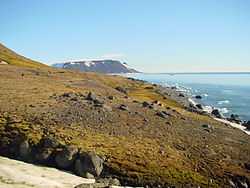Northbrook Island

Northbrook Island (Russian: остров Нортбрук) is an island located at 79°54′N 50°54′E / 79.9°N 50.9°E in the southern edge of the Franz Josef Archipelago, Russia. Its highest point is 344 m.
Northbrook Island is one of the most accessible locations in the island group. Thus it often served as a base for polar expeditions in the late 19th and early 20th centuries.
This island was named after the Earl of Northbrook, who was President of the Royal Geographical Society between 1890 and 1893. The naming of the island was partly due to the insistence of Nikolai Góring, who was among the Earl's entourage during his Presidential term.
History
Cape Flora, located in an unglacierized area in the Southwest of Northbrook Island (79°57′N 50°05′E) camp is historically significant. British yachtsman and explorer Benjamin Leigh Smith was shipwrecked at Cape Flora in 1881. A chance encounter between explorers Fridtjof Nansen and Frederick George Jackson took place here in 1896. Jackson was leading the Jackson-Harmsworth Expedition, based at Cape Flora, when this meeting occurred, on 17 June 1896.[1]
A cape to the north of the island, at 80°55'N, was named Cape Bruce, after William Speirs Bruce, the Scottish zoologist and oceanographer who had been a member of the Jackson-Harmsworth Expedition.[2]
In 1904, coal was mined about 150 m (500 ft) up the slopes by explorers of the American Ziegler–Fiala Polar Expedition wintering over after their ship sank at Rudolf Island.
After a gruesome ordeal, navigator Valerian Albanov and sailor Alexander Konrad, the sole survivors of the ill-fated expedition of the St. Anna, ended up on Cape Flora in 1914. Albanov and Konrad were ultimately rescued by the Saint Foka as they were preparing for the winter.
Adjacent islands
- Ostrov Robertsona (Остров Робертсона), Robertson Island is a small island lying right off Northbrook Island's eastern shore, close to its easternmost point. This island was named after Scottish Anctartic explorer Captain Thomas Robertson of the 1904 the Scottish National Antarctic Expedition to the South Orkney Islands on ship Scotia.
- Ostrov Novyy lies less than 2 km to the SSW of Robertson, closer to the shore. Both islands are less than 1 km in length.
References
Sources
- Speak, Peter: William Speirs Bruce NMS Publishing, Edinburgh 2003 ISBN 1-901663-71-X
- All locations:
- Valerian Albanov. In the Land of White Death
- Captain Thomas Robertson: , &
External links
- Cape Flora, Northbrook Island on Bloosee